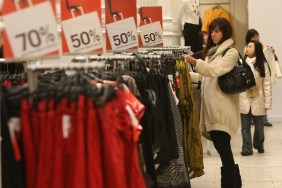In the wake of the tragedy in Bangladesh, breaking our dependence on cheap fashion and finding high-quality alternatives that are manufactured and sourced according to ethical standards seems increasingly urgent.
Founders Soraya Darabi and Maxine Bédat believe that ethical fashion has parallels to the food movement, which taught us that although eating sustainably may be more expensive, it pays dividends in taste and health.
“Whole Foods, Trader Joe’s and The Fresh Market offer transparency in their own ways. Consumers now demand that when shopping for food in Greemarkets, too. Ten years ago it was a different story,” Darabi told me in a conversation I had with the founders over Gchat.
(Formerly the social media manager for The New York Times, Darabi went on to launch the mobile app Foodspotting, which was reportedly sold to OpenTable for $10 million; Bédat comes to Zady with a background in international law and development, and is the founder of The Bootstrap Project, a nonprofit dedicated to supporting craft artisans in the developing world.)
Zady is predicated on the idea that beauty and style need to be central to any project promoting ethical fashion. “We like to think about style first,” said Bédat. “We’re women, of course. We won’t sacrifice style.”

The founders vet every piece they sell according to a rigorous set of standards — whether the item is locally-sourced, handmade, uses high-quality raw materials, is environmentally-conscious or made in the U.S.
“We interview our brands not once, but twice,” says Darabi. “First, our buying team asks them to sign a certificate authenticating the products and their origins. So we show, first on a map of the world and later through an in-depth article, the headquarters of a product, where the item is manufactured and also where the raw materials of the item come from. Then, with that info, we begin a phone or in-person interview — we prefer in-person to know our makers and companies better — and we sit down with them to talk about how their brand came to be, why beautiful and sustainable products are important to them.”
Several labels have signed on for the launch, which is still about six weeks away: Denim designers Imogene + Willie, handbag designer Clare Vivier, Ecoalf, a brand that works with recycled materials out of Spain, 70-year-old peacoat brand Gerald & Stewart, and leather handbag designer Karmo.
(To sign brands, Darabi and Bédat tapped Stephanie Seeley, the former VP of merchandising for Magic in Las Vegas, the world’s largest fashion trade show.)
Pricing is where it gets sticky. For those of us accustomed to shopping fast fashion or even mid-range brands, $600 may seem like an indecent amount of money to spend on a coat. The price point makes Zady’s product line largely upscale by default, limiting the company’s potential impact (what makes fast fashion so devastating is the industry’s enormous customer base). The company’s founders believe that greater consumer demand will eventually drive down prices.

“In our parents’ generation about 95% of our clothing was made in the U.S. In this generation, the number is reversed,” says Bédat. “Only a generation ago, before fast fashion existed, we all paid a little more and had fewer things. It was not a matter of luxury or boutiques, it was just how things were for all of us. If all of us support this mission and save to spend on that slightly more expensive shirt, then the demand will be there. Our factories can open up and through scale we will be able to offer even more competitively priced goods that are ethically produced.”
As Elizabeth Cline reports in her book Overdressed: The Shockingly High Cost of Cheap Fashion, Americans spend a smaller percentage of our incomes on clothing than we ever have before, even though we buy staggeringly more stuff. This is part of the catch-22 of H&M’s new recycling program: we wouldn’t have so much clothing we needed to throw away if companies like H&M weren’t pushing us to buy more and more of it, and to treat it as if it were disposable.
Bédat says, “We are very focused on finding those products that are accessible. We will not sell you the cheapest T-shirt in terms of absolute price, but in terms of the price per use, we hope to offer the best deal out there. In fast fashion, clothing is actually made to fall apart in a few washes. We think it’s better to spend a few extra dollars buying something nice that you will actually want to wear and will last for years to come. It’s about timeless style over the ever churning fashion cycles we have been trained these past few years to accept.”





